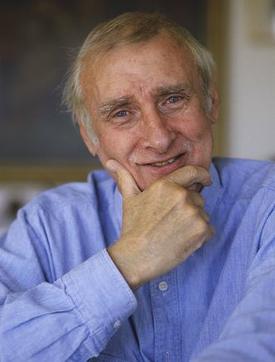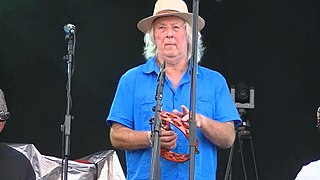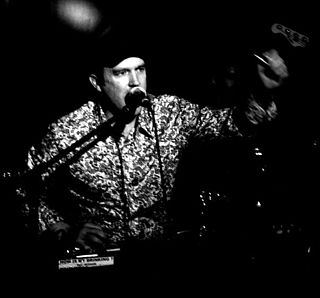Related Research Articles

Terence Alan "Spike" Milligan was an Irish comedian, writer, musician, poet, playwright and actor. The son of an English mother and Irish father, he was born in British Colonial India, where he spent his childhood before relocating in 1931 to England, where he lived and worked for the majority of his life. Disliking his first name, he began to call himself "Spike" after hearing the band Spike Jones and his City Slickers on Radio Luxembourg.

The South African music scene includes both popular (jive) and folk forms like Zulu isicathamiya singing and harmonic mbaqanga. Other popular genres are Marabi, Kwaito, house music, Isicathamiya, Gqom, rock music, hip hop and Amapiano.

Nokugcina Elsie Mhlophe, known as Gcina Mhlophe, is a South African storyteller, writer, playwright, and actress. In 2016 she was listed as one of BBC's 100 Women. She tells her stories in four of South Africa's languages: English, Afrikaans, Zulu and Xhosa, and also helps to motivate children to read.

Gerald Conway is an English folk and rock drummer/percussionist, best known for having performed with the backing band for Cat Stevens in the 1970s, Jethro Tull during the 1980s, and a member of Fairport Convention from 1998 to 2022, alongside various side projects. Conway has done a considerable amount of work as a session musician. Conway is married to vocalist Jacqui McShee, who is the singer of Pentangle, a band Conway is also a member of.
Edward William Welch is an English songwriter, composer, conductor and arranger.

Battery 9, an industrial music project from Johannesburg, South Africa, is the brainchild of Paul Riekert, who writes, plays and records the music in a mixture of English and Afrikaans. The band name is sometimes written, without a space, as Battery9.

Solomon Popoli Linda OIG, also known as Solomon Ntsele, was a South African musician, singer and composer best known as the composer of the song "Mbube", which later became the pop music success "The Lion Sleeps Tonight", and gave its name to the Mbube style of isicathamiya a cappella later popularized by Ladysmith Black Mambazo.
"Ag Pleez Deddy" is a South African song written and recorded by Jeremy Taylor, and released in 1962. It was written for the stage show Wait a Minim!, and has been described as the musical's "showpiece". It provides a light-hearted insight into the lives of young white working-class South Africans, whose outlook has absorbed both English-language and Afrikaans influences, along with a fascination with consumer culture. On the surface a children's song, it became broadly popular.

Dana Valery Catalano is an Italian-born South African-reared singer, actress, and television performer who started her career in the entertainment industry at the age of 16 in Johannesburg, South Africa where her family emigrated from Italy in 1947.

Andrew Tracey is a South African ethnomusicologist, promoter of African music, composer, folk singer, band leader, and actor. His father, Hugh Tracey (1903–1977), pioneered the study of traditional African music in the 1920s–1970s, created the International Library of African Music (ILAM) in 1954, and started the company African Musical Instruments (AMI) which manufactured the first commercial kalimbas in the 1950s.
Wait a Minim! (1962–68) was a musical revue conceived by Leon Gluckman, with original songs by Jeremy Taylor, and a collection of international folk music arranged by Andrew Tracey. Many authentic instruments were played to accompany dances and pantomimes satirizing the national characteristics and political and social eccentricities of many different countries. The only spoken words were when the cast was introduced, and in the South African scene where apartheid was ridiculed.
Isak Roux is a South African born German composer born in 1959. He is known for his arrangements of South African music, especially his work with the musical groups Ladysmith Black Mambazo and Kwela Tebza.
Aled Wyn Davies is a classical tenor from Llanbrynmair, in Powys, Mid Wales. He is a member of the Three Welsh Tenors with Rhys Meirion and Aled Hall.
Alun Davies is a Welsh guitarist, studio musician, recording artist, and composer who rose to fame primarily with his supporting guitar work and backing vocals as accompanist for English musician Cat Stevens, from early 1970 to 1977.
Zebra & Giraffe is an alternative rock band from South Africa. The band's debut album, Collected Memories, was released on 5 May 2008.

Jim Neversink is a South African musician, singer and songwriter. His musical style spans indie rock, country, americana and punk.
Afrikaanse Idols was a special season of South African reality interactive show Idols South Africa based on the British talent show Pop Idol. In difference to the rest of the series this season was held entirely in Afrikaans as the host, judges and contestants did not speak English on the show and every song was performed in Afrikaans.
Although the set and stage design remained the same, the entire judging panel was formed new consisting of Afrikaans-speaking singers Mynie Grové, Taliep Petersen, who was murdered just a few weeks after the competition ended and media personality Deon Maas. The show also switched channels to KykNET, an Afrikaans sisters station of MNet and was hosted by boyband member Sean Else (Eden). The Afrikaans season was aired between the third and fourth English seasons of the show. Dewald Louw from Bloemfontein won the show. Before that he was also a contestant on the second English season of the show where he made the top 24. He also auditioned for season three but failed to progress from the first round. Next to a recording contract with Sony BMG, winner Dewald Louw also won a Peugeot 206, R50,000 from the ATKV, a Shure microphone, R3200 worth of prizes from Look &Listen, a laptop computer and a gift pack from Truworths valued at R10,000.
"Soweto Blues" is a protest song written by Hugh Masekela and performed by Miriam Makeba. The song is about the Soweto uprising that occurred in 1976, following the decision by the apartheid government of South Africa to make Afrikaans a medium of instruction at school. The uprising was forcefully put down by the police, leading to the death of between 176 and 700 people. The song was released in 1977 as part of Masekela's album You Told Your Mama Not to Worry. The song became a staple at Makeba's live concerts, and is considered a notable example of music in the movement against apartheid.

Bittereinder is a South African rap/electro band from Pretoria who perform in Afrikaans. Jaco van der Merwe, Peach van Pletzen, and Louis Minnaar founded the three-man band in 2009, and have since performed at major South African festivals such as Oppikoppi, across southern Africa, and the Netherlands. They are known for their high-energy performances.
Willem Botha is a South African singer, actor and music producer from Riversdale, Western Cape. He was the runner-up of Afrikaanse Idols reality music programme and predominantly performs Afrikaans language songs.
References
- ↑ "SA Rock Digest" . Retrieved 15 November 2017.
- ↑ Jeremy Taylor 3rd earmusic.com
- 1 2 New York Times, 27 July 1962, "Folksong a Hit in South Africa"
- ↑ "Folk song a hit in South Africa; Parody by Oxford graduate spreads to other lands". The New York Times. 22 July 1962. ISSN 0362-4331 . Retrieved 14 December 2020.
- ↑ Heywood, Christopher (18 November 2004). A History of South African Literature. Cambridge University Press. ISBN 978-0-521-55485-5.
- ↑ "Jeremy Taylor: South Africa mustn't despair". popspeaking.com. 7 November 2015. Retrieved 15 November 2017.
- ↑ Gaylard, Rob (1 November 2011). "David Kramer: a biography". South African Theatre Journal. Taylor & Francis Group. 25 (3): 252–254. doi:10.1080/10137548.2011.674718. eISSN 2163-7660. ISSN 1013-7548. S2CID 161069318.
- 1 2 Byerly, Ingrid Bianca (1996). The music indaba: Music as mirror, mediator and prophet in the South African transition from apartheid to democracy (PhD thesis). North Carolina: Duke University.
- ↑ Lucia, Christine (26 March 2009). The World of South African Music: A Reader. Publishing. pp. 94–95. ISBN 978-1-4438-0779-1.
- ↑ Plummer, Mark Melody Maker , 16 September 1972 Davies the Guitar